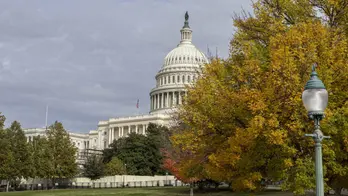Alabama providers suspend IVF treatments after state court’s ruling as fertility experts weigh in
A decision from the Alabama Supreme Court has led to a halt in IVF services at some locations and a flurry of protests from providers in the fertility space.
The court ruled on Feb. 16 that under state law, frozen embryos are considered children, stating in the decision that "the Wrongful Death of a Minor Act applies on its face to all unborn children, without limitation."
The decision was in response to two wrongful death cases brought by three couples whose frozen embryos were destroyed in an accident at an Alabama fertility clinic.
FDA APPROVES FIRST AT-HOME STERILE INSEMINATION KIT TO HELP WITH INFERTILITY: 'GIVES ME GOOSEBUMPS'
Justices ruled that an 1872 state law allowing parents to sue over the death of a minor child "applies to all unborn children, regardless of their location."
"Unborn children are ‘children’ ... without exception based on developmental stage, physical location, or any other ancillary characteristics," Justice Jay Mitchell wrote in the ruling.

A decision from the Alabama Supreme Court has led to a halt in IVF services at some locations and a flurry of protests from providers in the fertility space. (REUTERS/Remo Casilli/File Photo)
This includes "unborn children who are located outside of a biological uterus at the time they are killed."
Pro-life advocacy group Live Action reacted to the decision in a statement.
"Each person, from the tiniest embryo to an elder nearing the end of his life, has incalculable value that deserves and is guaranteed legal protection," Lila Rose, president and founder of Live Action, said in the statement.
Fox News Digital reached out to Live Action for additional comment.

In the Alabama court's ruling, the chief justice referenced upholding "the sanctity of unborn life," phrasing that appears in the Alabama Constitution. (Photo by Jessica Rinaldi/The Boston Globe via Getty Images)
In the court's ruling, Chief Justice Tom Parker referenced upholding "the sanctity of unborn life," a phrase that appears in the Alabama Constitution.
"Even before birth, all human beings bear the image of God, and their lives cannot be destroyed without effacing his glory," Parker said in the ruling.
IVF providers halt services
In response to the court's ruling, the largest hospital system in Alabama — the University of Alabama at Birmingham (UAB) — announced on Wednesday that it would be suspending its in-vitro fertilization treatments.
"The UAB Division of Reproductive Endocrinology and Infertility has paused in-vitro fertilization (IVF) treatments as it evaluates the Alabama Supreme Court’s decision that a cryopreserved embryo is a human being," the hospital said in a statement provided to Fox News Digital.
STUDY SUGGESTS MEDITERRANEAN DIET COULD BOOST MALE FERTILITY: 'CRUCIAL ROLE'
"We are saddened that this will impact our patients’ attempt to have a baby through IVF, but we must evaluate the potential that our patients and our physicians could be prosecuted criminally or face punitive damages for following the standard of care for IVF treatments," the statement continued.
The hospital noted that other components of fertility treatments — "everything through egg retrieval" — remain in place, and only the actual egg fertilization and embryo development are paused.
On Thursday, two additional fertility providers — Alabama Fertility Specialists and the Center for Reproductive Medicine in Mobile, Alabama — both announced that they would be pausing their IVF treatments, according to local reports.

A laboratory worker fills a test tube at an IVF clinic. In response to the court's new ruling, some Alabama providers have suspended their IVF services. (Jack Atley/Bloomberg via Getty Images)
Doctors weigh in
Dr. Asima Ahmad, co-founder and chief medical officer of Carrot Fertility and a practicing reproductive endocrinologist and fertility specialist based in Chicago, Illinois, shared her opinions on the ruling.
"Access to IVF is now at stake in Alabama due to the recent ruling from the Alabama Supreme Court," she said in a statement to Fox News Digital.
CHEMICALS IN WATER AND HOUSEHOLD OBJECTS COULD REDUCE CHANCES OF PREGNANCY, LIVE BIRTHS: NEW STUDY
"This decision could have serious consequences for people who are desperately seeking to have children, including clinics shutting down, doctors moving out of the state for fear of practicing, pricing increases, and changes in medical practice to avoid lawsuits, which might not be ideal for the patient."
Ahmad warned that the ruling could result in "profound damage" to fertility care access.
"IVF is a crucial part of reproductive science and allows women to have children who otherwise couldn't."
"As physicians, it is our fundamental duty to do no harm, and this could take away our ability to practice medicine in a way that we think is most ethical and safe for our patients," she added.
Dr. Marc Siegel, clinical professor of medicine at NYU Langone Medical Center and a Fox News medical contributor, reacted to the ruling’s impact on IVF availability in an interview with Fox News Digital.
CLICK HERE TO SIGN UP FOR OUR HEALTH NEWSLETTER
"IVF is a crucial part of reproductive science and allows women to have children who otherwise couldn't," he said.
"Freezing eggs is an important part of the process, because it allows women to utilize these eggs later on when the timing is better or when they have found the right partner."

An embryologist works on a petri dish at a fertility clinic. Approximately 13.4% of U.S. women between ages 15 to 49 experience infertility, according to the Centers for Disease Control and Prevention. (AP Photo/Sang Tan)
Freezing embryos also allows a couple more options in terms of timing, Siegel said, which may increase the chance of a viable child.
"It is important that a frozen embryo not be used casually or frozen without plan for use, but I believe that IVF is an important option that brings children to couples," he said.
CLICK HERE TO GET THE FOX NEWS APP
"Certainly, if your religious beliefs indicate that life begins at conception, or in forming an embryo, than you should abstain," he added. "For others, it is an important option."
Approximately 13.4% of U.S. women between the ages of 15 and 49 experience infertility, according to the Centers for Disease Control and Prevention (CDC).
For more Health articles, visit www.foxnews.com/health.
Disclaimer: The copyright of this article belongs to the original author. Reposting this article is solely for the purpose of information dissemination and does not constitute any investment advice. If there is any infringement, please contact us immediately. We will make corrections or deletions as necessary. Thank you.







